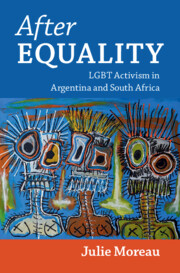
-
Select format
-
- Publisher:
- Cambridge University Press
- Publication date:
- 19 June 2025
- 03 July 2025
- ISBN:
- 9781009592963
- 9781009593007
- 9781009593014
- Dimensions:
- (229 x 152 mm)
- Weight & Pages:
- 0.479kg, 252 Pages
- Dimensions:
- (229 x 152 mm)
- Weight & Pages:
- 0.39kg, 252 Pages
You may already have access via personal or institutional login
Book description
After Equality tackles one of the biggest challenges facing LGBT activists in many parts of the world: how to move beyond inclusive legislation to ensure LGBT people can exercise their newly acquired rights. Drawing from in-depth interviews and ethnographic observation with two lesbian organizations in Buenos Aires, Argentina and Cape Town, South Africa, Julie Moreau explores the ways that organizations use identity to make rights useful. Engaging interdisciplinary scholarship and intersectional theory, Moreau develops a novel approach to identity strategizing that explains how activists engage multiple identities to challenge the relationships between identity categories and address the ways interlocking systems of power affect their constituents. By analyzing sexual identity as always constructed through race, class and gender, the book transforms how scholars understand the role of identity in the strategic repertoires of social movement organizations and illuminates dimensions of identity politics that surface in the aftermath of legal inclusion.
Reviews
‘In After Equality, Julie Moreau unpacks one of the most pressing challenges for LGBTQ movements: ensuring that legal victories translate into lived equality. Focusing on the experiences of activists in Argentina and South Africa, Moreau's comparative ethnography reveals how social movements navigate the limitations of formal inclusion by deploying intersectional strategies that address the intertwined effects of sexuality, race, and class. This book is a powerful contribution to understanding the evolving dynamics of LGBTQ rights in the global South. Moreover, it offers political science's limited focus on LGBTQ movements a fresh and essential perspective, by centering those led by women.'
Phillip Ayoub - University College London
Contents
Metrics
Altmetric attention score
Full text views
Full text views help Loading metrics...
Loading metrics...
* Views captured on Cambridge Core between #date#. This data will be updated every 24 hours.
Usage data cannot currently be displayed.
Accessibility standard: Unknown
Why this information is here
This section outlines the accessibility features of this content - including support for screen readers, full keyboard navigation and high-contrast display options. This may not be relevant for you.
Accessibility Information
Accessibility compliance for the PDF of this book is currently unknown and may be updated in the future.

